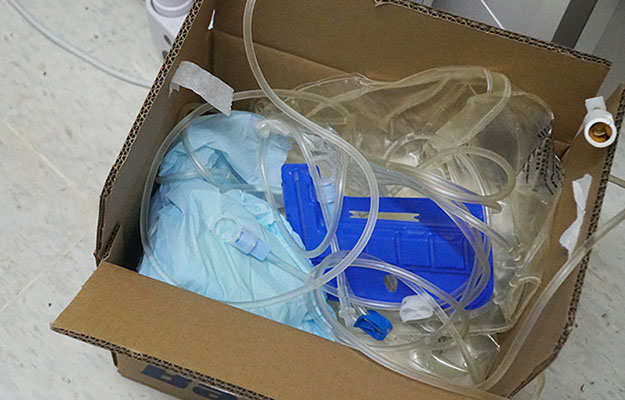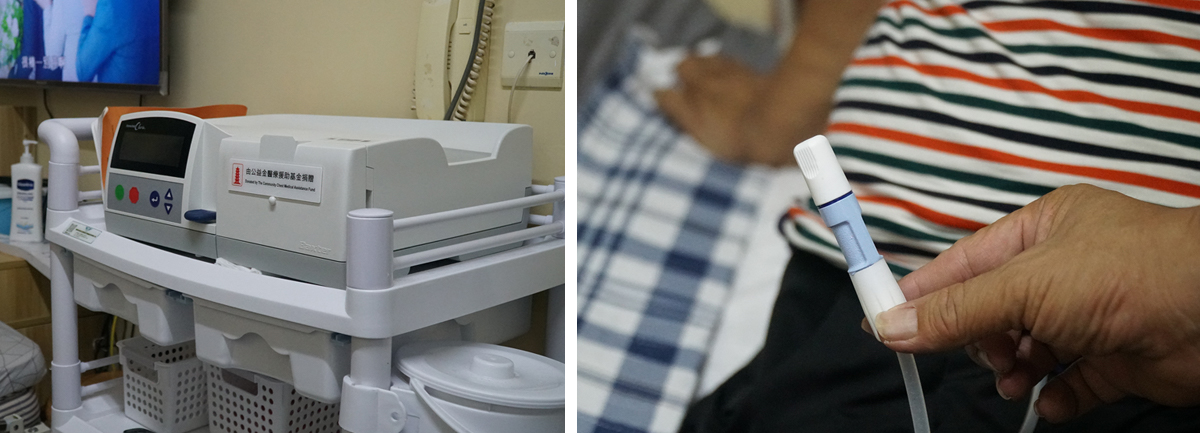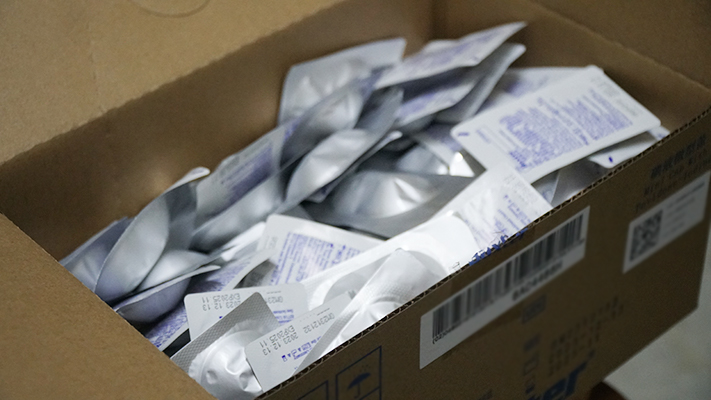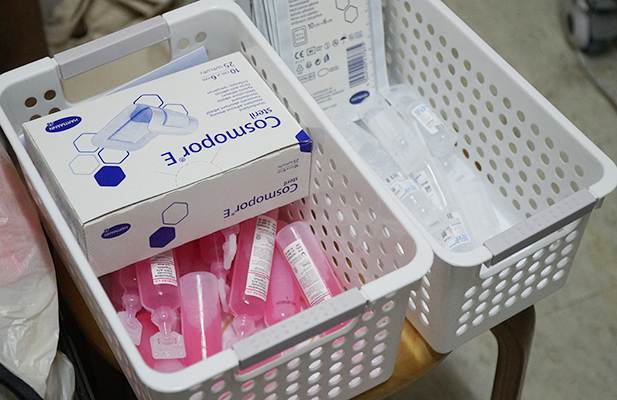Support the Frail with Inclusive Collection Services
Stepping into Tsui-han's a one-person public housing flat, there was a refrigerator and plenty of cardboard boxes containing peritoneal dialysis fluid at the entrance and outside the kitchen. In the cramped living room, there was a bed, a table, and an automated peritoneal dialysis machine, leaving very little space for anything else. The room was also filled with medical supplies. Tsui-han, who was lying on the bed, got up to greet me but quickly laid back down, complaining of weakness in her waist and dizziness, caused by her low blood pressure. You may wonder how much the disabled and those with chronic diseases would have to pay for medical waste once the waste charging scheme is implemented. And, how do they manage to dispose of their rubbish daily?
The interviewee of this article, Tsui-han, passed away before publication.
Thank you for her sincere sharing with her son.

Kidney dialysis generates a large amount of medical waste daily
Tsui-han is a 76 year-old woman who was diagnosed with kidney disease four years ago. Since last year, she has been undergoing peritoneal dialysis at home every day. Due to her frailty and inability to walk, her son helps her with the treatment every day after work. 'The treatment produces a lot of waste!' said his son, Mr. Ng.
He proceeded to open multiple cardboard boxes, unveiling the various medical supplies required for kidney dialysis. The majority of the components were disposable, including a double-bag tube set, an 'octopus-like' tube, a tube plug, two packs of dialysis fluid, and detergent. 'There are numerous cotton and paper towels I use to wash my hands after every step of the treatment. The doctor advised me to use paper towels to wipe my hands to avoid bacterial infection.' The medical waste is heavy, after folding and squeezing, 'I can barely fit it into a large plastic rubbish bag. Then I will put the plastic bag into a carton and throw it away.' He is concerned that the government-issued bags may be easily torn and have less capacity, so he may need to place the rubbish in a plastic bag before putting it in the designated bag.
"We don't intentionally produce any medical waste."
Campaign groups in Hong Kong appealed for free rubbish bags to be provided for the disabled and chronically ill when the waste charging scheme starts. The appeal came after a survey revealed that nearly 30% of the rehabilitated people required the use of more than 150 to 240 five-liter plastic bags monthly. These bags cost 60 HK cents each and can amount to a total cost of up to $90 to $144 per month, which would be four times the cost of a three to four-person household. Mr. Ng expressed his frustration with the new waste charge and said frankly, 'I feel like I’m being punished.' Even though the waste charge is not a fine, it is based on the polluter-pays principle aiming to encourage household waste reduction and recycling by providing economic incentives. But for the general public, particularly the elders, are not familiar with this concept and finds it difficult to understand. Mr. Ng believed that the government should have done a better job of educating the public about the new initiative, adding that the sick do not intentionally produce any waste, 'we do not have a choice.’ Therefore, Ng believed that it was unjust to categorise household medical waste as general waste. He explained, ‘Presently, my mother is dealing with incontinence and has to change her diapers frequently. She already feels that she has lost her dignity, and the thought of being charged for disposing of these wastes only makes her more uncomfortable.' The groups have appealed to the government to provide free designated rubbish bags to those in need, with doctors deciding the quantity required. They have also suggested that district councillors and members of community care teams should be deployed to publicise these free rubbish bags to people who may not be able to learn about it through other sources. The main aim of this exemption is not to question the fairness of the policy, but to show empathy towards vulnerable people with disabilities and special needs.

A Carer's Lament: 'I have no more energy for recycling.'
Ella Cheng, a social worker from Un Chau OPlus, still remembers two months ago when Tsui -han came to the center with a cane and sought evening home care services for elders. 'She doesn't want her son to be too tired to take care of her.' Ella said. Unfortunately, there are no evening home care services in Hong Kong. To help her, Ella arranged for home cleaning and daycare center services. 'Previously, she had no access to any services and could only eat bread for lunch at home. The reality is that many elders prefer to age in the community, but the service gap leaves them with no choice but to live in residential care homes.'
Mr. Ng is an only child and shared that there are over 20 cartons of peritoneal dialysis fluid in his mother's home, 'But I lack the energy to sort and take all the cartons to the recycling store.' Mr. Ng expressed. He sighed as he explained that his mother's health had worsened since she was hospitalized due to drug sensitivity at the end of last year. 'At first, she was able to move around with the help of crutches, but after a few months, she became weak and started falling frequently. As a result, she now needs a wheelchair to move in and out of places. Additionally, she experiences seizures more often in the morning, her head feels muddled, and she sometimes speaks incoherently.' Mr. Ng has been staying at his mother's house recently to take care of her. He mentioned that he hardly gets any rest since he wakes up in the morning. 'From the moment I open my eyes in the morning, there is no time to rest,' Mr. Ng sighed. Every morning, Mr. Ng wakes up early and has breakfast with his mother. He then takes out the rubbish from the previous night's medical supplies and escorts his mother to the daycare center before hurrying off to work. As a driver, he must remain extra focused during work hours. In the evening, he and his mother have dinner at a fast-food restaurant and return home around 8 pm to complete all the necessary personal care procedures and treatments, which usually take until 9:30 pm. 'It is so stressful!' Mr. Ng therefore suggests door-to-door recycling support services for those in need.

Western Countries provide door-to-door recycling support for household medical waste
Household medical waste is handled differently in foreign countries. General recyclables can be disposed of at community recycling points or by door-to-door recycling services. Some cities, like the City of York Council, offer free clinical waste collections for those who need to self-medicate at home, as they state that medical waste is primarily the responsibility of medical professionals.
Household medical waste is divided into three categories: sharps box collection, bagged clinical waste collection, and additional help with household waste collection. For sharps box collection, needles should be placed in a sealed authorised yellow sharps box. For bagged clinical waste collection, infectious or potentially infectious waste should be placed in orange bags. The organisation responsible for waste collection will only collect bagged clinical waste following a referral from the district hospital. If individuals need additional help with household waste collection, they can apply for it. If they miss the collection date, they can contact the organisation to rearrange the service.

Recycling is not only a social responsibility, but also a right
'In fact, there are many obstacles for elders to take out rubbish.' Mr. Ng pointed out. As he takes care of his mother, he has become more sensitive to the needs of the elders. Ella, who has been serving the elders in the district for a long time, can deeply relate to this issue, 'many frail elderly living alone in the district face challenges when walking out of their doors and taking out the rubbish. Some have even accidentally fallen while doing so.' Mr. Ng further added that the current design of rubbish bins on each floor is not disability-friendly. He observes that many elderly people, who have difficulty walking and use crutches, stumble around carrying rubbish. The bins are too tall and have heavy lids, making it difficult for the elderly. 'It is useless even if there are recycling bins under every building, as recycling bins are not conveniently allocated for the disabled.' Ella said.
In 2022, The Hong Kong Polytechnic University published research titled 'Inclusive Recycling: Challenges And Needs of Wheelchair Users in Hong Kong'. The study found that wheelchair users and disabled individuals face difficulties in different stages of recycling, such as collecting, carrying, and disposing of the recyclables in bins. During field visits, it was observed that public housing estates used different recycling bins, which hindered wheelchair users and disabled individuals from recycling. The path to the bins was often too narrow for wheelchair users to access, and even if they could get closer to the recycling bin, they couldn't touch it when they leaned forward. Additionally, they were unable to open the lids of recycling bins since the lids were typically located on top of them.
The study involved thirteen wheelchair users, out of which seven had a recycling habit, and the rest did not. One of the wheelchair users who didn't have the habit of recycling reported that throwing rubbish was already challenging due to their disability, so they wouldn't think of recycling. They would only deposit one or two plastic bottles when passing by the recycling bins. The study also discovered that when self-efficacy is high enough, users are more likely to start recycling behaviour. Therefore, when promoting universal participation in sustainable development, "barrier-free" policies and designs are critical.

Smart accessible recycling bins in foreign countries meet the requirements of waste charging schemes.
Nowadays, smart recycling bins that are easily accessible to people with mobility impairments are becoming increasingly common in European countries. The design of these bins is much shorter and easier to use, and they can automatically open their lids when people scan them with a smart card. These bins also comply with the 'pay as you throw' policy, which encourages people to recycle. In 2017, Hillary Scanlon, a Canadian with visual impairment, launched a program called 'Sustainability Through An Inclusive Lens' in partnership with CleanRiver, a Canadian organization that provides recycling solutions. She challenged the idea that recycling, despite being a social responsibility of everyone, is also a privilege. In 2021, Hillary brought her vision to life and officially launched a solution to make recycling bins more accessible. In addition to lowering the height, the new bins are a two-part system that provides both tactile and visual information to help individuals with disabilities dispose of recyclables. The bins let users know when they are within a certain distance, and once in the vicinity, indicators help them determine where to place their waste using different symbols.
Everyone needs to recycle. However, CleanRiver raises the question of whether everyone can recycle. With the waste charging scheme set to be implemented in Hong Kong in the coming months, it is worth revisiting the discussion on how to promote inclusivity in terms of policy and facilities that support sustainability.








